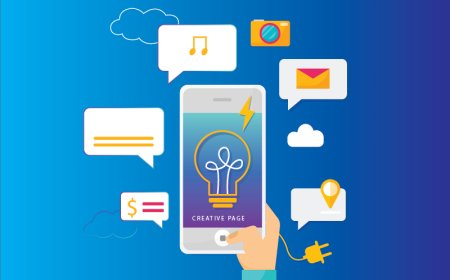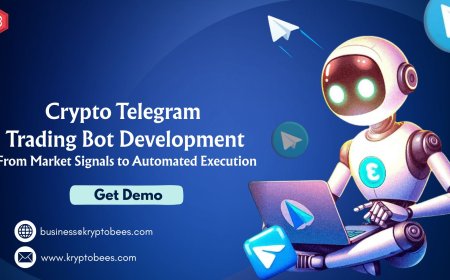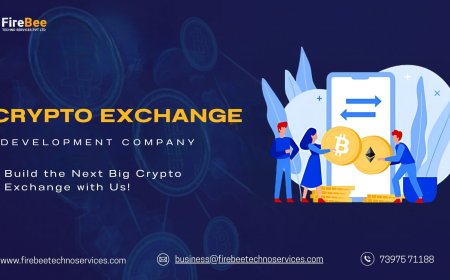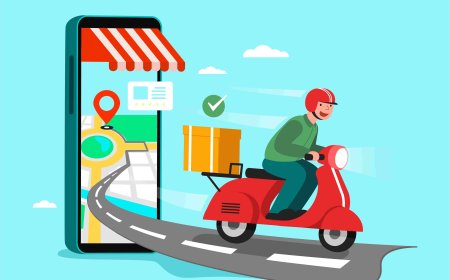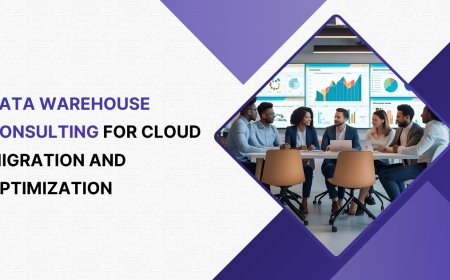How Artificial Intelligence App Development Services Empower Businesses
Artificial intelligence (AI) has come a long way from being a futuristic concept in sci-fi movies to becoming the foundation of today’s most powerful business tools. In 2025, AI isn’t just optional—it’s essential. From predictive analytics to automation and hyper-personalization, AI is reshaping how companies interact with users and how they operate internally.

Introduction
The Evolution of AI in Mobile and Web Applications
Artificial intelligence (AI) has come a long way from being a futuristic concept in sci-fi movies to becoming the foundation of todays most powerful business tools. In 2025, AI isnt just optionalits essential. From predictive analytics to automation and hyper-personalization, AI is reshaping how companies interact with users and how they operate internally. Nowhere is this transformation more visible than in mobile and web applications.
Todays AI-powered apps dont just respond to user inputthey learn from behavior, analyze data in real time, and even make smart decisions. Whether its a virtual shopping assistant in an e-commerce app, a predictive health tracker in a wellness app, or a fraud detection module in a finance app, AI is behind the scenes, making every interaction smarter, faster, and more intuitive.
For businesses, AI apps mean enhanced customer engagement, streamlined operations, better decision-making, and most importantly, a competitive advantage. Companies that adopt AI-driven apps can reduce costs, improve user retention, and gain actionable insights, putting them miles ahead of those still stuck in traditional development models.
Why AI-Powered Apps Are a Game-Changer for Modern Businesses
Lets face itusers today are demanding. They expect apps to be not just functional, but intelligent. They want personalized content, instant support, seamless navigation, and relevant recommendations. Traditional applications, which rely solely on pre-coded logic, simply cant meet these expectations. Thats where AI comes in.
AI-powered apps adapt and evolve. They learn from every user interaction to deliver tailor-made experiences. They automate repetitive tasks, identify trends, and even predict user needs before users express them. For businesses, this means more meaningful engagement, fewer resources spent on manual processes, and more accurate strategic planning.
But the impact doesnt stop at user experience. AI apps also empower internal teamssales, marketing, HR, financewith data-driven insights and process automation. They reduce human error, increase efficiency, and open doors to new revenue streams.
In short, AI app development isnt just a tech upgradeits a business transformation engine.
Understanding AI App Development
What is AI App Development?
AI app development is the process of integrating artificial intelligence technologies into mobile or web applications to enable machines to simulate human-like intelligence. Unlike traditional software that follows explicit programming rules, AI applications use data, algorithms, and iterative learning to make intelligent decisions.
These apps rely on components like machine learning (ML), natural language processing (NLP), computer vision, and deep learning to process inputs, identify patterns, and act independently. Whether its a self-learning chatbot, a recommendation engine, or a visual search tool, the core of AI app development lies in building systems that get smarter over time.
The development process typically involves:
- Identifying business problems that AI can solve
- Gathering and preprocessing data
- Choosing the right AI models and algorithms
- Training the models with data
- Integrating AI models into a functional user interface
- Testing, deploying, and refining the application
AI app development is as much about data and algorithms as it is about delivering value to end users. And when done right, it can drastically change how businesses function and scale.
Core Components of AI Applications
AI apps are complex under the hood, but they all share some core building blocks that power their intelligence:
- Data Pipeline: Collects, cleans, and processes raw data. The quality and quantity of this data determine how well the AI model will perform.
- Machine Learning Model: The heart of the AI system, where algorithms are trained to learn from data and make predictions or decisions.
- Inference Engine: Uses trained models to make real-time decisions based on new inputs.
- Feedback Loop: Enables the system to learn from new data and continuously improve.
- User Interface (UI): Allows users to interact with the AI system seamlessly through voice, text, visuals, or gestures.
A robust AI app seamlessly integrates all these components to deliver value with every interaction.
Differences Between Traditional and AI-Based Apps
Its important to understand how AI-powered apps differ from traditional ones:
Feature: Traditional Apps, AI-Based Apps
Behavior Rule-based Data-driven, adaptive
Learning Static Learns from interactions
Personalization Limited: Highly personalized
Decision-Making Manual or predefined Predictive and automated
Maintenance requires manual updates, and self-improving over time
AI apps grow smarter with usage, which means better performance, user satisfaction, and business ROI over time. Traditional apps, meanwhile, require constant manual updates and lack the flexibility modern users expect.
Key Benefits of AI in Business Applications
Automation and Operational Efficiency
One of the most powerful advantages of AI app development is its ability to automate routine, repetitive, and time-consuming tasks. From scheduling meetings to analyzing thousands of data points in seconds, AI transforms tedious workflows into seamless, hands-off processes. This level of automation saves valuable time and resources, allowing businesses to focus more on strategic activities and innovation.
For instance, AI can automatically sort customer service inquiries and assign them to the right departments, or even resolve them through chatbots. In finance, AI algorithms can reconcile transactions and flag anomalies in real-time. In HR, AI apps streamline resume screening, onboarding processes, and employee performance evaluations.
This kind of efficiency not only reduces human error but also drastically cuts operational costs. Businesses can scale faster without proportionally increasing their workforce. Its like hiring an army of digital workers that never sleep, take breaks, or make mistakesjust consistent productivity, 24/7.
Moreover, with intelligent process automation, businesses can maintain better compliance, ensure higher quality standards, and react faster to market changes. In a highly competitive digital landscape, this speed and efficiency give companies a massive edge.
Personalized User Experiences
We live in the age of hyper-personalization. Consumers expect every app they interact with to understand their preferences, behaviors, and needs, and deliver content or services that match them precisely. This is where AI truly shines.
AI-powered apps analyze user data such as browsing history, purchase behavior, time spent on different features, and even sentiment to tailor experiences in real time. For example:
- Streaming platforms like Netflix recommend shows based on viewing habits.
- eCommerce apps offer personalized product suggestions and dynamic pricing.
- Fitness apps adjust workouts based on past performance and goals.
This level of personalization leads to higher engagement, increased retention, and ultimately, more conversions. When users feel like an app gets them, theyre more likely to keep using it and recommend it to others.
Personalization also improves customer satisfaction. Instead of generic content, users get precisely what they need, when they need it. And the more they interact, the smarter the app gets, creating a self-reinforcing loop of value and loyalty.
Predictive Analytics and Business Intelligence
Imagine being able to anticipate what your customers want before they even ask. Thats the promise of predictive analyticsone of the most transformative aspects of AI in business applications.
AI apps collect and analyze vast amounts of historical and real-time data to identify patterns, detect trends, and forecast outcomes. This enables businesses to make smarter, data-driven decisions that are proactive rather than reactive.
For example:
- Retailers can forecast inventory needs and avoid stockouts or overstocking.
- Financial institutions can predict loan defaults and market shifts.
- Healthcare providers can anticipate patient health issues based on early indicators.
These predictive capabilities arent limited to enterprise giants anymore. Thanks to scalable cloud AI services, even small businesses can access powerful forecasting tools via AI apps.
The insights gained from predictive analytics also help refine marketing strategies, optimize operations, improve product development, and deliver better customer service. Businesses no longer need to guessthey have the data and tools to act with confidence.
Use Cases of AI App Development Across Industries
Retail and eCommerce
In the retail space, AI apps are completely changing how businesses sell and how consumers shop. With intelligent search features, virtual stylists, and voice-based shopping assistants, AI is creating a seamless, personalized customer journey.
AI-powered recommendation engines analyze user behavior and preferences to suggest products users are most likely to buy. Visual search features let users snap a photo and find similar products instantly. Dynamic pricing algorithms adjust prices based on demand, competitor pricing, and user history to maximize conversions.
Behind the scenes, AI also handles inventory management, demand forecasting, fraud detection, and supply chain optimization. With AI apps, retail businesses are not only boosting sales but also streamlining operations and improving customer satisfaction.
Healthcare
Healthcare is one of the most impactful fields for AI app development. From diagnostics to patient engagement, AI apps are revolutionizing how care is delivered and managed.
For example:
- AI diagnostic tools help detect diseases like cancer, diabetes, and Alzheimers earlier and more accurately than traditional methods.
- Virtual health assistants guide patients through symptom checks and treatment plans.
- Predictive health analytics forecast potential complications before they become severe.
AI-powered apps also assist in managing electronic health records, ensuring compliance with regulations like HIPAA, and reducing the administrative burden on healthcare providers. With remote monitoring and real-time data analysis, AI apps are making healthcare more accessible, efficient, and personalized.
Finance and Banking
AI has become the backbone of innovation in the finance sector. Whether its detecting fraud, managing risk, or enhancing customer service, AI app development is empowering banks and fintech firms to operate smarter and safer.
Chatbots in mobile banking apps provide instant support and even financial advice. AI-driven algorithms evaluate creditworthiness, personalize investment strategies, and process loan applications faster than ever. Fraud detection systems analyze transactions in real-time and flag suspicious activities before they cause damage.
Moreover, AI apps help with regulatory compliance, portfolio management, and customer retention by identifying clients at risk of churn. With AI, financial institutions are not only improving internal operations but also redefining customer trust and experience.
Manufacturing and Logistics
In manufacturing and logistics, AI-powered apps are driving the next industrial revolutionIndustry 4.0. Smart factories use AI apps for predictive maintenance, reducing equipment downtime and extending the life of machinery. Computer vision detects defects in production lines with high accuracy.
In logistics, AI apps optimize routes, predict delivery times, and manage warehouse operations. Real-time tracking systems powered by AI provide transparency and improve customer satisfaction.
By analyzing supply chain data, AI apps also help businesses respond to disruptions faster, whether its a pandemic, a shipping delay, or a change in market demand. The result is more resilient, responsive, and efficient operations.
Technologies Driving AI App Development
Machine Learning and Deep Learning
At the heart of every intelligent app lies machine learning (ML), a subset of AI that enables software to learn from data and improve over time without being explicitly programmed. In 2025, ML has evolved with more advanced capabilities, including deep learning, a powerful technique that mimics the neural networks of the human brain.
Machine learning models are used in apps to perform tasks like customer segmentation, spam detection, and demand forecasting. Deep learning takes it a step further with applications in image recognition, speech translation, and complex pattern detection.
For businesses, the use of these technologies means smarter applications that can:
- Analyze millions of data points in real-time
- Continuously improve accuracy through feedback
- Adapt to new trends and behaviors without manual intervention
Whether you're building a fitness app that adjusts workouts based on user progress or a financial app that detects fraud, ML and deep learning make it possible to deliver truly intelligent solutions.
Natural Language Processing (NLP)
Natural Language Processing (NLP) is the branch of AI that focuses on the interaction between computers and human language. It's what enables AI-powered apps to understand, interpret, and respond to voice and text inputs in a natural, human-like way.
Todays NLP tools power everything from smart chatbots to voice assistants like Siri or Alexa. In business apps, NLP is used for:
- Customer support automation: AI chatbots that handle FAQs, order tracking, and basic troubleshooting.
- Sentiment analysis: Identifying how customers feel based on their reviews, emails, or messages.
- Voice-to-text services: Allowing hands-free interactions, useful in healthcare, logistics, and more.
With NLP, businesses can offer round-the-clock support, analyze customer feedback at scale, and improve user engagement through conversational interfaces. It's like giving your app a personalityone that listens, understands, and responds meaningfully.
Computer Vision and Speech Recognition
Computer vision allows AI-powered apps to "see" and understand visual content like images and videos. Speech recognition, on the other hand, enables the app to understand spoken language, transforming voice into usable data.
These technologies are at the core of some of the most innovative apps today:
- Retail apps using visual search and virtual try-ons
- Healthcare apps analyzing X-rays and MRIs
- Security apps using facial recognition for authentication
- Language learning apps with speech feedback for pronunciation
Computer vision helps businesses analyze visual data efficiently, while speech recognition expands accessibility and usability. Both are essential for delivering intuitive, user-friendly experiences, especially in industries that rely heavily on non-text inputs.
How AI App Development Services Work
Consultation and Requirement Analysis
Every successful AI app starts with a deep understanding of your business goals and challenges. The first phase of AI app development involves consulting with stakeholders to identify pain points, define objectives, and outline the project scope.
During this phase, the development team will ask:
- What problem are you trying to solve?
- Who are your users, and what are their needs?
- What data do you have, and is it clean and usable?
- Whats the desired user experience and functionality?
This strategic groundwork helps shape the roadmap, choose the right AI technologies, and set realistic expectations regarding time, cost, and performance. It ensures that the final product is not only technically sound but also aligned with your business vision.
Data Collection, Training, and Model Deployment
Once the scope is clear, the real work begins. AI models need large volumes of high-quality data to function effectively. This step includes:
- Collecting structured and unstructured data from relevant sources
- Cleaning and preprocessing data to remove noise and inconsistencies
- Selecting the best machine learning algorithms for the use case
- Training models using historical and real-time data
After training, the model is validated for accuracy and performance. Once it passes testing, its integrated into the app through APIs or direct embedding.
The development team will also design user interfaces, test interactions, and ensure the app is optimized for speed, scalability, and user experience. Whether its a chatbot, a recommendation engine, or a predictive dashboard, the focus remains on delivering a seamless and intuitive solution.
Continuous Updates and Maintenance
AI isnt a set-it-and-forget-it technology. Once the app is live, it enters a crucial phasemaintenance and optimization. This involves:
- Monitoring app performance in real time
- Updating models with new data to improve accuracy
- Fixing bugs, enhancing UI/UX, and scaling as needed
AI models can experience drift over time if they arent updated. Regular training and fine-tuning ensure that the app continues to deliver reliable results. Businesses should opt for AI app development services that offer long-term support, including analytics dashboards, performance tracking, and regular upgrades.
With continuous monitoring, your AI app stays relevant, accurate, and effective in an ever-evolving business landscape.
Choosing the Right AI App Development Partner
Skills and Expertise to Look For
When choosing an AI app development partner, the first and most crucial factor is their expertise. AI is a complex field, and not every software company has the depth of knowledge required to deliver high-performing, scalable AI applications.
Look for teams that include:
- Data scientists skilled in machine learning, deep learning, and neural networks
- Software engineers who understand cloud platforms, APIs, and mobile development
- UX/UI designers experienced in integrating AI into user-friendly interfaces
- AI ethicists or data privacy experts to ensure compliance and fairness
Ask about their experience with specific AI tools and frameworks like TensorFlow, PyTorch, OpenCV, NLP libraries, and cloud AI services such as AWS SageMaker, Google Vertex AI, or Azure ML. The more diverse and deep their expertise, the better equipped theyll be to bring your vision to life.
Portfolio, Reviews, and Case Studies
Past work is a strong indicator of future performance. A reliable AI development company should have a diverse portfolio that includes similar projects in your industry. Review their case studies to understand:
- What problems did they solve
- What AI technologies did they use
- What results were delivered (KPIs, business outcomes, user engagement)
Also, dont underestimate the value of reviews and testimonials. Platforms like Clutch, GoodFirms, and G2 provide transparent client feedback. Better yet, request references and speak directly with previous clients to gain firsthand insights into collaboration style, responsiveness, and reliability.
If a company is hesitant to share examples or references, thats a red flag. Transparency and proven results are essential when investing in something as critical as AI.
Real-World Examples of Successful AI Apps
Chatbots and Virtual Assistants
AI-powered chatbots and virtual assistants are some of the most visible and widely adopted AI applications today. Theyre used across industries for customer service, lead generation, appointment booking, and even internal team support.
Popular examples include:
- Drift and Intercom for sales and customer engagement
- Google Assistant and Siri for hands-free task execution
- Woebot, a mental health chatbot that offers cognitive behavioral therapy
These bots reduce support costs, offer 24/7 availability, and significantly improve user satisfaction through instant, intelligent responses. With advancements in NLP and sentiment analysis, theyre becoming more human-like every day.
Recommendation Systems
Recommendation engines are the brains behind personalized content delivery. Youll find them in:
- Netflix suggests movies youll love
- Spotify is crafting your daily mix playlists
- Amazon recommends products based on past behavior
These systems analyze user data, preferences, and context to predict what someone wants before they even search for it. Businesses that deploy recommendation systems in their apps see a sharp increase in user engagement, retention, and sales.
Its not just limited to entertainment or retailtravel, education, and finance apps are all integrating recommendation engines to guide user decisions more effectively.
Intelligent CRM and ERP Tools
Customer Relationship Management (CRM) and Enterprise Resource Planning (ERP) systems have undergone a major transformation thanks to AI. Traditional systems relied heavily on manual input and interpretation, but intelligent CRM/ERP tools now:
- Predict customer churn
- Automate data entry
- Suggest the best follow-up actions
- Forecast sales and revenue
Platforms like Salesforce Einstein, Zoho CRM AI, and SAP Leonardo exemplify how AI enhances enterprise apps. These tools empower sales, marketing, and operations teams to work smarter, not harder, with real-time insights, automation, and strategic guidance.
Challenges in AI App Development
Data Privacy and Ethical Considerations
AI apps depend heavily on data, but with great data comes great responsibility. Mishandling user information can lead to legal issues, reputational damage, and loss of customer trust.
Businesses must ensure:
- GDPR, HIPAA, and CCPA compliance (depending on geography and industry)
- Transparent data usage policies
- Secure storage and access controls
- Use of anonymized and consented data
Ethical AI also means avoiding bias in models, ensuring fairness, and building systems that explain their decisions clearly. In 2025, AI ethics isnt optionalits expected.
Integration with Legacy Systems
Many businesses operate on outdated or fragmented systems, and integrating AI with them can be a significant challenge. Legacy databases, rigid APIs, and poor documentation often slow down development and increase costs.
To overcome this, companies may need middleware, data modernization strategies, or custom connectors. A skilled AI development partner will help navigate this complexity with scalable, flexible solutions that bridge the old with the new, without causing disruptions.
High Cost and Complexity
AI app development is resource-intensive. It requires specialized talent, powerful infrastructure, and ongoing maintenance. Costs can quickly rise if not managed properly.
Key contributors to cost include:
- Data collection and labeling
- Cloud infrastructure and compute power
- Continuous model training and testing
- Compliance and security layers
However, the long-term benefitscost savings, automation, increased revenuetypically outweigh the upfront investment. Starting with a Minimum Viable Product (MVP) is often a smart move to test ROI before full-scale rollout.
The Future of AI App Development
Rise of Generative AI in Apps
Generative AI has exploded in popularity, and in 2025, its being widely integrated into applications for content creation, design, software development, and more.
Think:
- Copy.ai or Jasper for marketing content
- DALLE for image generation
- ChatGPT for intelligent conversational agents
These tools can now be embedded directly into apps, allowing users to generate text, visuals, and ideas instantly. Businesses are using generative AI to boost creativity, automate content production, and enhance user interaction.
Edge AI and Real-Time Processing
Edge AI refers to running AI models directly on local devices rather than in the cloud. This brings faster processing, lower latency, and increased privacyideal for industries like healthcare, autonomous vehicles, and IoT applications.
Edge AI enables real-time decision-making without needing constant internet access. For example, a smart home app can process voice commands locally, or a wearable can detect health anomalies and alert users instantly.
As 5G expands, edge computing will become even more powerful, offering AI capabilities with minimal delay and maximum efficiency.
Democratization of AI for Small Businesses
AI is no longer just for tech giants. Thanks to pre-built models, no-code tools, and AI-as-a-Service platforms, small and medium businesses can now afford to build intelligent apps.
Tools like Google AutoML, Microsoft Azure AI Studio, and OpenAI APIs make it possible to integrate AI without hiring massive development teams. This levels the playing field and allows startups and SMBs to compete on innovation.
From chatbots and recommendation engines to smart inventory systems and marketing automation, small businesses now have access to tools that were once out of reach. The democratization of AI is hereand it's empowering entrepreneurs like never before.
Conclusion
Custom AI app development is no longer a luxuryits a necessity for any business looking to stay competitive in 2025 and beyond. From streamlining operations and enhancing customer engagement to delivering predictive insights and personalized experiences, AI apps offer transformative benefits across industries.
But success depends on thoughtful execution. You need the right development partner, a clear strategy, and a deep understanding of your business goals. When these elements come together, the result is not just an app, but a powerful tool that drives growth, innovation, and value.
So whether youre a startup exploring new opportunities or an enterprise looking to optimize at scale, investing in AI app development is one of the smartest decisions you can make today.
FAQs
Q1: What is the cost of developing an AI-powered app?
The cost varies widely depending on complexity, features, and industry. A basic AI MVP may start at $20,000$50,000, while complex, enterprise-grade solutions can exceed $200,000.
Q2: How long does it take to build an AI app?
Development time typically ranges from 3 to 9 months. Factors like data availability, model training, testing, and feature set play a role in determining the timeline.
Q3: Can AI apps work offline?
Yes, with edge AI technology, apps can perform real-time processing on local devices, allowing functionality even without internet connectivity.
Q4: Are AI apps secure?
Security depends on implementation. Reputable AI apps use encryption, secure APIs, access controls, and comply with data protection regulations like GDPR and HIPAA.
Q5: How do I maintain my AI application after launch?
Maintenance involves monitoring performance, retraining models with new data, updating features, and ensuring security patches are applied regularly. Choose a development partner who offers long-term support.


